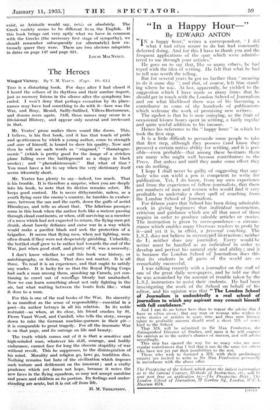The Heroes Winged Victory. By V. M. Yeates. (Cape. 10;.
61) Tills is a disturbing book. For days after I had closed it I heard the echoes of its rhythms and their sombre import, just as memory listens in the silence after the symphony has ended. I won't deny that perhaps evocation by its place- names may have had something to do with it—here was the War, and Bray, Mesnil, Sailly-Saillisel, Villers-Bretonneux, and dozens more again. Still, those names may occur in a Divisional History, and appear only neutral and irrelevant in that.
Mr. Yeates' prose makes them sound like doom. This, I believe, is his first book, and it has that touch of pride and sreirtiveness by which a young author, come to strength and sure of himself, is bound to show his quality. Now and then he will use such words as niagraed," " thanatogno- monie " (which is pretty good for the image of a stricken plane falling over the battleground as a shape in black smoke) ; and phenakistoscopic." But what of that ? You must have a lot to say when the very dictionary itself seems irksomely short.
Mr. Yeates has plenty to say—indeed, too much. That is his trouble. It is therefore a surprise, when you are deeply into his book, to note that its diction remains sober. He keeps good control. He is never dithyrambic, unless, as a youth flying over the enemy's country, he tumbles in exuber- ance, between the sun and the earth, down the gulfs of aerial Himalayas, and tells us about that. The hilarious passages come in this book when the author feels like a meteor passing through cloud continents, or when, still surviving as a member of a mess which had not expected to return, the flying men get drunk, shout bawdy defiance and curse war in a way which would make a pacifist blush and seek the protection of a brigadier. It seems that flying men, when not fighting, were often drunk if they were not desperately gihibling. Unluckily, the bottled stuff grew to be rather bad towards the end of the War, just when good stuff, and plenty of it, was a necessity.
I don't know whether to call this hook war- history, or autobiography, or fiction. That does not matter. It is all three. To read it is an experience, and that ought to satisfy any reader. It is lucky for us that the Royal Flying Corps had such a man among them, smashing up Camels, yet con- tinuing to crawl out of wreeltage bloody but unabashed. Now we can learn something about not only fighting in the air, but what waiting between the bouts feels lice : what it does to a man.
For this is one of the real books of the War. Its sincerity is as manifest as the sense of responsibility--essential in a poet—its author betrays in all his relation. In its noble restraint—as' when, at its close, his friend crashes by St. Pierre Vaast Wood, and Cundall, who tells the story, sweeps down to rake the German machine-gunners in their pit— it is comparable to great tragedy. • For all the insensate War is on that page, and its outrage on life and beauty.
The truth which comes out of it is that tv sensitive and high,minded man, -whatever his skill, courage, and bodily endurance, cannot face for long the obscene stupidity of war without revolt. This he suppresses, to the disintegration of his mind. Morality and religion go, laws go, tradition dies. Nothing remains but hate of the civilization which imposes such torture and defilement on the innocent ; and a crafty prudence which yet dares not hope, because it notes the new faces in the flying squadron, so may not accept sunshine and peace and children as its portion. Its feelings and under- standing are acute, but it is cut off from life.
H. M. To3u.ixsox.






































 Previous page
Previous page